

Neil deGrasse Tyson. Neil deGrasse Tyson (/ˈniːəl dəˈɡræs ˈtaɪsən/; born October 5, 1958) is an American astrophysicist, author, and science communicator.
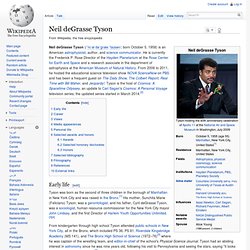
He is currently the Frederick P. Rose Director of the Hayden Planetarium at the Rose Center for Earth and Space and a research associate in the department of astrophysics at the American Museum of Natural History. From 2006 to 2011, he hosted the educational science television show NOVA ScienceNow on PBS and has been a frequent guest on The Daily Show, The Colbert Report, Real Time with Bill Maher, and Jeopardy!.
Tyson is the host of Cosmos: A Spacetime Odyssey, an update to Carl Sagan's Cosmos: A Personal Voyage television series; the updated series started in March 2014.[2] Early life[edit] Astronomer Carl Sagan, who was a faculty member at Cornell University, tried to recruit Tyson to Cornell for undergraduate studies.[3] In an interview with writer Daniel Simone,[8] Tyson said: Promoting Cosmos TV series in Australia for National Geographic. Ayaan Hirsi Ali. Ayaan Hirsi Ali (Dutch: [ɑˈjaːn ˈɦirsi ˈaːli] ( When she was eight, Hirsi Ali's family left Somalia for Saudi Arabia, then Ethiopia, and eventually settled in Kenya.
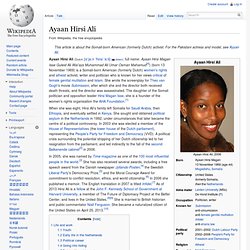
She sought and obtained political asylum in the Netherlands in 1992, under circumstances that later became the centre of a political controversy. In 2003 she was elected a member of the House of Representatives (the lower house of the Dutch parliament), representing the People's Party for Freedom and Democracy (VVD). A political crisis surrounding the potential stripping of her Dutch citizenship led to her resignation from the parliament, and led indirectly to the fall of the second Balkenende cabinet[2] in 2006. Sam Harris (author) American philosopher, neuroscientist, author, and podcaster Samuel Benjamin Harris (born April 9, 1967) is an American author, philosopher, neuroscientist, and podcast host.
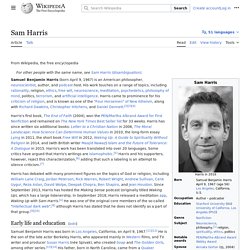
His work touches on a wide range of topics, including rationality, religion, ethics, free will, neuroscience, meditation, psychedelics, philosophy of mind, politics, terrorism, and artificial intelligence. Christopher Hitchens. Daniel Dennett. Daniel Clement Dennett III (born March 28, 1942)[1][2] is an American philosopher, writer, and cognitive scientist whose research centers on the philosophy of mind, philosophy of science and philosophy of biology, particularly as those fields relate to evolutionary biology and cognitive science.[3] Early life and education[edit] Dennett was born on March 28, 1942 in Boston, Massachusetts, the son of Ruth Marjorie (née Leck) and Daniel Clement Dennett, Jr.[6][7] Dennett spent part of his childhood in Lebanon, where, during World War II, his father was a covert counter-intelligence agent with the Office of Strategic Services posing as a cultural attaché to the American Embassy in Beirut.[8] When he was five, his mother took him back to Massachusetts after his father died in an unexplained plane crash.[9] Dennett says that he was first introduced to the notion of philosophy while attending summer camp at age 11, when a camp counselor said to him, "You know what you are, Daniel?
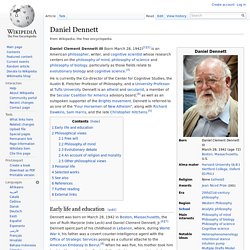
First ... Taslima Nasrin. Taslima Nasrin (Bengali: তসলিমা নাসরিন; also Taslima Nasreen, born 25 August 1962) is a Bengali author and former physician who has lived in exile since 1994.
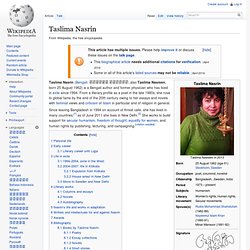
From a literary profile as a poet in the late 1980s, she rose to global fame by the end of the 20th century owing to her essays and novels with feminist views and criticism of Islam in particular and of religion in general. Since leaving Bangladesh in 1994 on account of threat calls, she has lived in many countries;[1] as of June 2011 she lives in New Delhi.[2] She works to build support for secular humanism, freedom of thought, equality for women, and human rights by publishing, lecturing, and campaigning. [citation needed] Personal life[edit] Nasrin was born to Rajab Ali and Edul Ara in the town of Mymensingh in 1962. Nasrin has been married three times: first to Bengali poet Rudra Mohammad Shahidullah,[4] then to Bangladeshi journalist Nayeemul Islam Khan[5] and finally to editor Minar Mahmood.[6] Early career[edit] in her early 30s.